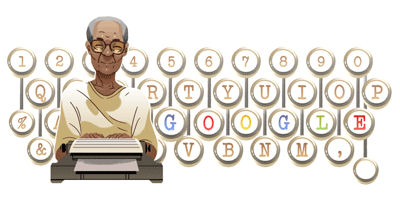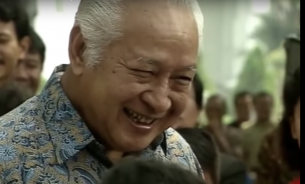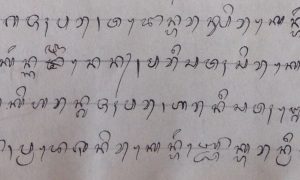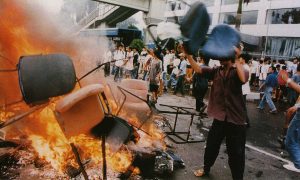Today would have been the 92nd birthday of the late Pramoedya Ananta Toer, the most important writer in Indonesia. His stature as a leading artist and his leftist politics led to his persecution by the Army-led government of Suharto. International audiences tended to focus on his imprisonment on Buru island between 1969 and 1979, during which he produced four novels now referred to as ‘the Buru quartet’. But for young Indonesians in the 1990s, he was a key inspiration in their mobilisations to topple Suharto and bring about political change.
Today Pramoedya is widely seen as a cultural hero, although his ideas are still considered highly provocative. This has to do with the fact that New Order ideology continues to dominate official discourse, both in the media and in schools. But since his death in 2006, the image of Pramoedya has become increasingly familiar in mainstream Indonesian culture. This year, Google Indonesia celebrated his birthday with a Doodle of him at his typewriter, indicating a level of public acceptance that would have been unimaginable twenty years ago.

To honour Pramoedya’s thinking, we at PoP have translated one of his interviews into English. The main thread of this interview is the role of young people in Indonesian politics and history. Pramoedya challenges the New Order’s distortion of the nation’s past, constructing an alternative vision that emphasises the egalitarian, maritime and revolutionary traditions of Indonesia.
This interview was conducted on 26 August 1999 by three interviewers: Daniel McGuire, Injil Abubakar, and Lexy Rambadeta.
[March 2018 Edit:] The YouTube videos of the original interview have been removed and appear not to have been archived.***
Why do student movements succeed and why do they bring about change?
All progress in Indonesia is driven by the youth and by students. I’ll explain the historical background first. In the beginning, students in the Netherlands in the 1910s were the ones who discovered their own country and nation, and their influence in Indonesia was the emergence of popular movements that were also composed of young people. But at that time, ‘the youth’ referred to children of the priyayi class, and the priyayi in their turn were the children of the political marriage between colonialism and feudalism. This gave birth to the priyayi class. And the youth that mobilised at that time, students and young people, were the children of priyayi. That’s the reason their influence continues, from the old generation to now. They seek to become bandwagons, so that other people don’t have to think for themselves. Just follow. That’s the culture of bandwagoning, a product of the priyayi. For that reason, democracy has never been present. When there are rowdy masses, opposing this and that, it’s bandwagoning. A culture of bandwagoning, not yet democracy as we understand it.
When the students mobilised, there were many riots and various buildings were burned down, in May last year [1998]. At that time, where you worried about Indonesia, about your own safety? How did you feel at that time?
Back then, some intelligence officers turned up at my house, and they asked, “Mr. Pram, what is your opinion on the riots?”. And I said, “you’re the ones who orchestrated the riots, so why are you asking me?” Usually when the youth mobilised to oppose the New Order, the state apparatus would immediately infiltrate them. That’s normal. Like the events of May 1998, the student movements were infiltrated by vertical politics. Everyone gets that now, it’s not a secret anymore.
Around six years ago, there were many students who formed study groups. They studied books by Marx and other banned writers in Indonesia, including yourself. There were some students who were arrested in Yogya. What happened at that time and how did you feel when you heard those reports?
Ever since the New Order was born, I was familiar with its tactics. So I wasn’t surprised that students were arrested only for reading my books. The New Order regime was a fascist regime, that is, to cause people to be fearful so that they would obey. That’s normal for fascist regimes everywhere, terrorising people to cause them to lose their self-worth and obey any instruction they are given. That’s normal for fascism, all over the world.
You have just written for Time Magazine about Sukarno.
I haven’t seen it.
I’m sorry for not bringing it with me. Why did you support Bung Karno? You were arrested yourself under Sukarno’s adminstration.
No. In Sukarno’s time I was kidnapped and imprisoned by the Army, not by Sukarno. Because since the Revolution, the Army has tried to become a state within a state. As long as Sukarno was president, there was another state, which was the Army. That was the military politics established by Nasution. Only it was Suharto who reaped the benefit, though it was Nasution who created it. Ever since the Revolution.
Perhaps as an artist you can describe the environment for artists under Suharto. What was the difference in the environment for artists between the periods of Sukarno and Suharto?
During the Sukarno period, there were two sources of power. Political power was held by Sukarno, while territory and human resources were controlled by the Army. But during the New Order, the Army held absolute power, headed by Suharto. There was no political power, only military power. So the situation for writers at that time was, if they were not afraid of the New Order, they were imprisoned or killed.
In the movements a year ago, did the students come to you to seek information?
Not just information. For the beginning I advised them to study the People Power movement of the Philippines. They tried to create a People Power movement, but it failed because the military didn’t join the students. But they went ahead anyway, which was good. Even though their People Power movement had failed. I had been telling them this for over ten years. During the demonstrations many of the students were talking about People Power. This was the case from the beginning, but in the end it failed because they could not draw the military in to join the students.
Why do all movements in Indonesia begin with students and not with labour? Previously there were not so many industrial workers, not so many factories, twenty years ago. Now there are many, so why does labour still not participate in the movements?
Why the students and the youth? Firstly, they are not yet constrained by a particular political system, their minds are still free. And now many of them study overseas, not like before. So this means that the students are more free than the workers. Workers are tied down by their employment. And all of those many factories, behind them is multinational capital. Don’t forget. If the workers strike, the state apparatus will crush them. They will side with the bosses, and behind the bosses is multinational capital.
It wasn’t for no reason that Sukarno had to be deposed. Behind that deposition was multinational capital, because they sought to exploit the wealth of Indonesia as well as its cheap labour. For that reason, Sukarno had to be brought down.
I don’t believe in the old generation, not in any of them. And the young generation represents the future. Whether Indonesia should be like this or that, let the young people decide. Whether it should be green or blue or white, it’s up to them. As long as it is better than what came before.
Do you think the upcoming elections will be fair or not?
How can I believe in the elections? The bureaucracy is the New Order bureaucracy, the military is the New Order military, the politicians are New Order politicians. For that reason, I personally don’t approve of it and I don’t want to participate in the elections. Because if I were to participate, I would only be choosing my own prison guard.
Where were you on 12 March 1998 when students were shot at Trisakti University, how did you hear about it, and what was your reaction?
I read about it in the papers, and I knew from before that, say the case were to be prosecuted, it would never result in a conviction. Because it was done by the Army, which has killed everywhere, ever since the Revolution, not just now. They kill everywhere, but only because they have weapons that others don’t. I’m often asked during my overseas travels, “why do killings occur in Indonesia?” Well, Indonesia only implements it, but you are the ones who supply the weapons for it. That has been the case since the New Order. They receive weapons to kill their own citizens. Because Indonesian citizens have to be made so small, their self-worth and dignity so debased, so that they are easy to direct, to make it easier for multinational capital to profit. For a long time that hasn’t surprised me.
If those weapons are from America…
Not only America. It’s just a business. They see it as a business issue, not a moral issue. Throughout the world there are activists who make a big deal of Indonesia, but they only go so far as being voices. In terms of the concrete reality, it is the Army who calls the shots here.
How do you make changes in Indonesia?
That’s easy for me to answer. The young generation. Problems in Indonesia can only be solved by the youth. They have to make the decisions and implement them alone. Because tomorrow or the next day, they will have to manage it all. So starting from today, they have to take action. Not just make the decisions, but implement them. Only the youth can respond. Don’t hope for anything from the political parties.
Are you writing new novels?
I can’t write. Even reading makes my eyes water. I only do physical labour now. You saw me before, burning some rubbish.
It seems that the student movements have been anticlimactic, how do you feel about that?
I’ve already told them, forget about your studies for the next two years, mobilise continuously. Because you only have power when you’re united in a demonstration. Outside of that, you have no power. For that reason, understand this, mobilise continuously, forget university for two years. Because the results of your actions now will be much more valuable than the results of your studies.
There are some who say that the young generation has potential but that they lack leadership, so that this potential can’t be maximised.
This is the real world, not heaven. Everything has its faults, and everyone has to strive to reduce their faults. Everything we want is blocked by obstacles, it would be heaven if they weren’t. And we’re not even talking talking about schisms and differences of opinion [within the movements], but that’s the way it is, and they have to overcome it themselves. If you think this is heaven, there’s no need for struggle at all.
What is the character of the Indonesian people, especially young people, their character today? Remembering that in history, Indonesian youth was highly revolutionary, how does it compare today?
Just look, young Indonesians today, from primary school to university, were taught lies by Suharto. If they can free themselves, or even reject or challenge those lies, that alone is great. Let alone standing against the power itself, and even successfully bringing Suharto down, that’s twice as impressive.
According to you, are there any young people who are like that today? Two thumbs up like before?
Many.
Who for example?
I won’t mention names, it’s not necessary. As far as I’m concerned they’re a group, not individuals.
What kind of people are they?
The kind who were able to bring down Suharto. Who pushed for reform. Which meant that they knew that the situation was wrong and needed reform. That alone was good. During the New Order, no-one pushed for improvement. Everyone leaned towards justifying Suharto, including the intellectuals, with all their lines of official titles. The students challenged them; that in itself is impressive.
Interrogating the Dictator
Nostalgic videos of Suharto reveal that the flaws of his rule were obvious to those who lived through it.
What was the New Order founded on? Murder, lies, as you said before?
The New Order was founded by the will of multinational capital, through the cooperation of the British and a particular wing of the Army. This wing was later led by Suharto. Suharto was never mentioned previously, the one who was often mentioned was Nasution. People didn’t expect Suharto at that time. Why did Suharto emerge instead of Nasution? It was Nasution who said that the PKI needed to be destroyed to its roots, and that was the order given for those killings.
Approximately how many people were killed at that time?
I myself was involved in setting up an NGO to study the 1965-66 killings. In my regency of Blora alone they found 5000 victims, around 10% of the population killed. Just in one regency. According to the Western press, 500,000 to 1 million. According to Domo, 2 million people. According to Sarwo Edhie, the commander who implemented that killing program on Suharto’s orders, 3 million. He said it with pride.
That was a huge massacre.
One of the largest of this century. Though not the largest, the largest was done by Hitler.
What about your friends, were any killed?
Plenty of artists were killed. Like the one who made the statue in Sukarno’s palace, what was his name? The one from Solo. And then the one who wrote the song Genjer Genjer. Even though the song was actually written in the Japanese period, and was popularised by LEKRA. He was a victim. I don’t remember their names individually. The ones at Buru alone, how many were killed there. Not a single case went to the courts. They wanted to make governing easier by killing, so that people would be afraid. They didn’t understand that people would eventually become bored of their own fear, and resist.
What is your opinion about Timor-Leste, Aceh, West Papua?
Regarding East Timor, that was an excessively stupid thing. Indonesia was founded to oppose colonialism. It is a country that was colonised by a small country. Now that it has become quite a large country, why should it colonise? Small-minded. And it wasn’t resolved for decades. Embarrassing. A colonised country becoming a coloniser, that’s stupid. If they were truly Pancasilist, they would help the East Timorese with aid, with experts. Let them be independent, that’s their right. As far as I’m concerned. And now the stupidity is being continued. It’s not just stupid, it’s idiotic. And the whole colonial mindset is idiotic. Giving aid and experts is cheaper than constant warfare and killing, to the extent that a third of their population was wiped out. The issue of East Timor was engineered by the Army alone.
But there was an ideological factor, the Cold War context.
Not an ideological factor, not the Cold War context. It was a mistake and a stupidity. This is a maritime country, so why is it being occupied by an Army? In a maritime state, the sea is a great road that links one island to another. Under army rule, the sea separates one region from another. This is an essential problem.
And don’t forget Java-centrism, which is a Dutch East India Company (VOC) legacy. So when the VOC succeeded in building the number one maritime empire in the world, its capital was in Batavia, not over there in the Netherlands. Which meant Java. From Java, the VOC sent Javanese killers out to conquer the Outer Islands, and from outside Java, the wealth was brought into Java. That was the VOC. When the VOC ended, this was continued by the Dutch East Indies. When the Indies fell, it stopped for a while because of the Japanese occupation. When Indonesia became independent, Java-centrism was resumed. Javanese killers were sent outside of Java, and wealth from the Outer Islands was brought to Java. This is a VOC legacy.
Because these leaders haven’t studied history, don’t know history, don’t have a sense of Indonesianness, they just keep going with this Java-centrism. Even the capital is still Batavia; that is, Jakarta. That’s why Sukarno wanted to cut the thread of that Java-centrism, by moving the capital to Palangkaraya [in Borneo]. The preparations were already being made. But Suharto came and cancelled it all.
What about Aceh?
All they do is kill, kidnap, trample and humiliate them, including babies. I would fight back too if I were treated that way. They still have their dignity and they should resist. But they shouldn’t secede, because Indonesia is a maritime unity.
A maritime unity created by the Dutch.
No, a geographical unity. The Dutch united it administratively. Sukarno united it politically. It wasn’t united by the Dutch. Geographically it is a maritime unity. That’s why, in the Majapahit period, it was called ‘Nusantara’, an archipelago between two continents. In the Singhasari period, when they were facing an invasion by Kublai Khan, it was called ‘Dipantara’, a fortress between two continents. It is a geographical maritime unity, but it’s only that the current leaders don’t have a sense of Indonesianness, and they don’t want to understand. Or they can’t understand.
Do you have an idol among Indonesian artists?
No, I don’t pay attention to anything outside of my own affairs.
How many works have you produced?
Including the ones destroyed by the Army, approximately 36. Just yesterday I compiled a list. 38. Including those destroyed.
How many were destroyed?
They have to be counted from this list. Approximately nine. In manuscript form, they had not been published yet.
What is your best work?
I don’t worry about good or bad, I never have. They are all my spiritual children, they have their own history, separate from me. When I’m asked about the links between me and my works, I never answer. There are those that died young, there are those that might live forever. That’s beyond my power.
Coming back to the youth, do you think that they need to collaborate with the military?
No. Don’t talk about the military, but about the Army. Because the military includes the Marines.
Aren’t they the same thing?
At least the Marines had a role in protecting the youth, when they were demanding that Suharto resign.
But they are ultimately part of the same command.
A single command, but they are different people. They also feel subjugated by the Army, and so does the Air Force. Even though they should be autonomous.
Can you give a message to the young people?
My message to the young people is: don’t pretend not to understand. You understand well enough what needs to be done. Do the best thing for Indonesia, and for yourselves. Don’t pretend to be stupid. You’re smart enough, you’re brave enough, you have the skill to unite all the youth movements. Keep moving until you reach your goal.
***
Translation by PoP’s textual historian Wayan Jarrah Sastrawan
 Facebook
Facebook  Twitter
Twitter  Soundcloud
Soundcloud  Youtube
Youtube  Rss
Rss 



